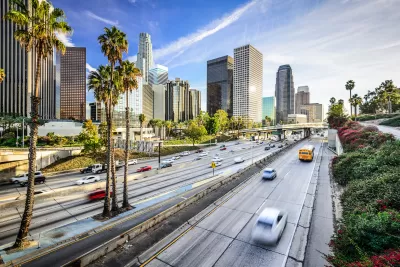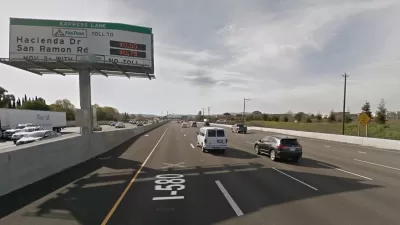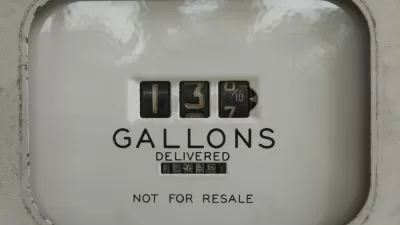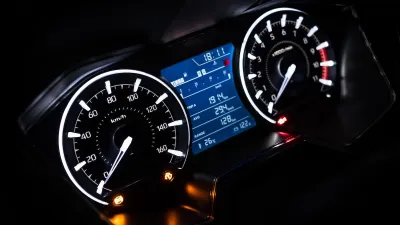The California Transportation Commission met the initial deadline specified in 2021 state legislation requiring the state to perform a fully operational pilot program where participants will pay for the miles they drive.

Unlike the federal mileage fee pilot program authorized by the 2021 Infrastructure Jobs and Investment Act, a committee under the state Transportation Commission met the initial deadline specified in state legislation that also passed in 2021 requiring the California State Transportation Agency to conduct a second road usage charge pilot program “as an alternative to the gas tax system.”
“The Road Usage Charge Technical Advisory Committee shall, by no later than July 1, 2023, make recommendations to the Transportation Agency on the design of the pilot program to test revenue collection, including the group of vehicles to participate in the pilot,” states Senate Bill 399 authored by Sen. Scott Wiener (D-San Francisco) and signed into law by Gov. Gavin Newsom on Sept. 24, 2021.
“With our transition to more fuel efficient vehicles — and ultimately away from carbon-fueled vehicles entirely — gas tax revenue will decline and eventually end,” wrote Wiener (via Planetizen) on June 1, 2021.
Unlike the first pilot conducted in 2016, participants will be required to pay the actual “fee per-mile traveled” for the pilot. Among the key recommendations in the 33-page Road Charge Pilot Design Recommendations (SB 339) report prepared by CDM Smith, Inc., the source article [pdf] for this post, released June 29:
- Establish a flat per-mile rate cohort, use a road charge rate of 2.5 cents per-mile for light-duty vehicles, higher for medium- and heavy-duty vehicles,
- Offer exemptions for out-of-state miles driven.
The legislation requires a second cohort in the pilot program where the participants will be charged a variable 'fee per-mile traveled' based on the fuel efficiency of their vehicle. These two cohorts are central to the program. [Italics are part of the report]:
SB 339 requires the California State Transportation Agency [CalSTA] to discuss in its final report the relative effectiveness of the two rate-setting methodologies in aligning “with the state’s climate, air quality, (and) zero-emissions vehicle… goals.”
SB 339 also requires CalSTA to discuss in its final report the effectiveness of the two rate-setting methodologies “in ensuring sustainable funding for transportation.”
Focus on revenue-collection system
In reading the report and contrasting it with the 2017 final report [pdf] after the 2016 pilot was concluded (also posted here), it's clear that the reporting and payment scheme has changed drastically. CalSTA appeared to be hoping for a "pay-at-the pump option for a road charge system,” as the 2017 report noted.
While the mileage reporting methods tested in the Road Charge Pilot Program are all feasible, they cannot compete with the simplicity, cost effectiveness, and public acceptance of the current gas tax collection process.
“It’d be point-of-sale technology,” said then-Caltrans Deputy Director Carrie Pourvahidi (via Planetizen) on December 8, 2017. “We’re looking for something so simple that there is nothing (the driver) has to do.”
If only that was possible. To further complicate revenue collection, participants will "receive a credit or a refund for fuel taxes or electric vehicle fees,” according to the legislation.
Timeline
According to a July 18 email from Lauren Prehoda with the Caltrans road charge program, the pilot will likely begin next year though a date hasn't been set. The next deadline is July 1, 2024 when CalSTA must “submit an interim report on the status of the pilot program” to the legislature. The final report is due “no later than December 31, 2026.”
In fact, the authorizing legislation for the pilot program ends on January 1, 2027. New legislation would have to be written to advance the road usage charge beyond that date, illustrating the lengthy process required to transition to “an alternative to the gas tax system.”
FULL STORY: Senate Bill 339 Road Charge Pilot Design Recommendations Report [pdf]

Planetizen Federal Action Tracker
A weekly monitor of how Trump’s orders and actions are impacting planners and planning in America.

Congressman Proposes Bill to Rename DC Metro “Trump Train”
The Make Autorail Great Again Act would withhold federal funding to the system until the Washington Metropolitan Area Transit Authority (WMATA), rebrands as the Washington Metropolitan Authority for Greater Access (WMAGA).

The Simple Legislative Tool Transforming Vacant Downtowns
In California, Michigan and Georgia, an easy win is bringing dollars — and delight — back to city centers.

The States Losing Rural Delivery Rooms at an Alarming Pace
In some states, as few as 9% of rural hospitals still deliver babies. As a result, rising pre-term births, no adequate pre-term care and "harrowing" close calls are a growing reality.

The Small South Asian Republic Going all in on EVs
Thanks to one simple policy change less than five years ago, 65% of new cars in this Himalayan country are now electric.

DC Backpedals on Bike Lane Protection, Swaps Barriers for Paint
Citing aesthetic concerns, the city is removing the concrete barriers and flexposts that once separated Arizona Avenue cyclists from motor vehicles.
Urban Design for Planners 1: Software Tools
This six-course series explores essential urban design concepts using open source software and equips planners with the tools they need to participate fully in the urban design process.
Planning for Universal Design
Learn the tools for implementing Universal Design in planning regulations.
Smith Gee Studio
City of Charlotte
City of Camden Redevelopment Agency
City of Astoria
Transportation Research & Education Center (TREC) at Portland State University
US High Speed Rail Association
City of Camden Redevelopment Agency
Municipality of Princeton (NJ)





























